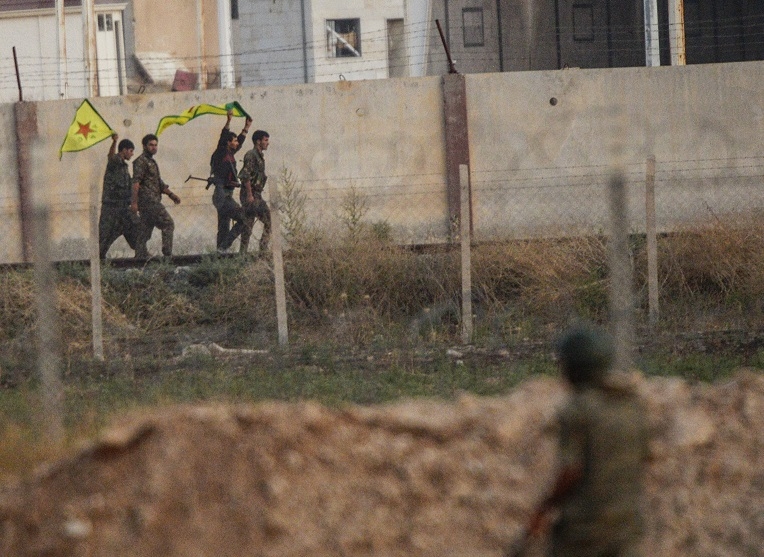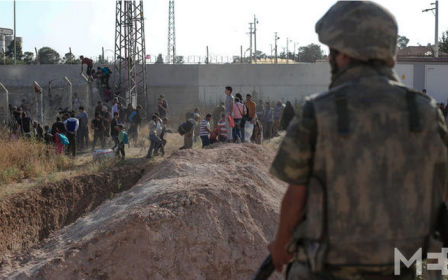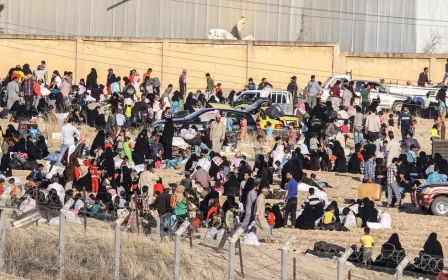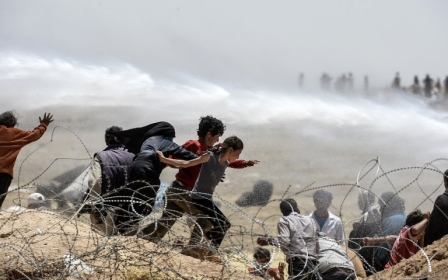ANALYSIS: Can Syrian Kurds maintain momentum after IS defeat in Tal Abyad?

After days of fierce fighting close to the Syria-Turkey border the Islamic State (IS) group appears to have suffered one of its biggest defeats in recent months.
Kurdish forces on Monday cut off the group’s main supply lines from Turkey and are now in the heart of the IS-held border town of Tal Abyad, which fell to IS a year ago but has been under the control of the rival al-Nusra Front and Ahrar al-Sham since 2013.
Such gains seemed almost impossible until recently. Experts have long been warning that US airstrikes have not been effective at stalling IS advances, with even NATO Secretary-General Jens Stoltenberg openly querying the approach.
Just last month, as the anniversary of IS's blitzkrieg attack on western Iraq drew ever nearer, the group seemingly proved its staying power, capturing the provincial capital Ramadi in Anbar province, and the tourist city of Palmyra in Syria. Further east, almost all of Deir Ezzor province also slipped under IS's control despite ongoing US-led anti-IS strikes, McClatchy reported.
Things had gotten so bad that commentators started to ask whether IS could be defeated, with Stephen Walt in Foreign Policy speculating that after Baghdad’s inability to counter their offensives, IS was likely there to stay.
But with Syrian Kurds having now taken Tal Abyad with support of US airstrikes, the tide could finally be about to change.
If the latest anti-IS drive is not quickly reversed, IS could see its ability to recruit fighters, especially from abroad, curtailed. The US-led coalition could also secure a small but not insignificant PR victory over IS, after a long string of setbacks.
“Without the airstrikes from the anti-IS coalition, the [Kurdish armed militia Peoples’ Protection Units] YPG would maybe need two years to take Tal Abyad, but the support from the coalition makes it possible that YPG is advancing very fast,” said Zana Omer, a Kurdish journalist based in Syria.
New alliances
The offensive has been long in the woodwork. As far back as November 2013, the YPG aimed to re-capture Tal Abyad to connect the isolated Kurdish enclaves in Kobane to the west and Hasakah to the east. The two had been divided by IS and al-Nusra gains which had seen the militant groups gain increasing control of the north.
In order to drive IS out, the YPG created a joint operations room named the Euphrates Volcano. The campaign was backed by Free Syrian Army (FSA) groups and had big ambitions. It formed the crux of the Syrian anti-IS force that stood firm against the IS assault on Kobane in early September 2014, and it aimed to captured all the territories around the Euphrates river, including the IS stronghold of Raqqa.
The band of YPG-FSA fighters around Kobane even tried to petition the newly formed anti-IS US-led coalition for help but initially to little avail.
While Iraqi Kurds managed to get Western support when attacked in August 2014, the Syrian Kurdish YPG was less lucky. The group is affiliated to the Kurdistan Workers Party (PKK), which is blacklisted by the US and Turkey as a "terrorist" group. Turkey also fiercely objected to any kind of military support out of fear that it could embolden its own Kurdish minority.
Without that backing, Operation Euphrates Volcano quickly began to seem like a strategic mistake. Almost immediately after its formation, IS attacked and looked poised to capture Kobane. Both Turkish and American officials at that point predicted that the city would fall.
But with the world's media descending to the Turkish-Syria border and broadcasting the fight and the refugee exodus that followed, the US unexpectedly reversed course and started carrying out airstrikes in Kobane. It soon went even further and pushed Turkey to allow heavily armed Kurdish fighters from Iraq to cross the border and come to the aid of the YPG.
At the time the Kurds considered themselves lucky that the US had realised that the fall of Kobane would not play out well for its strategy to “degrade” and destroy IS, but despite the support, the fighting was anything but straightforward.
It was not until January 2015 that the YPG, by now backed by the US-led coalition, finally managed to flush out IS.
This victory, though, was followed by a string of other less well-recorded but no less significant successes. By February, the YPG had made gains in Hasakah and had pushed IS out of Tal Hamis and Tel Brak. By May, the YPG – again backed by airstrikes – had reached as far south as the Abdul Aziz mountain, some 75 kilometres from the Turkish border. Much of Raqqa province, although not the capital, is now under YPG control.
The US has until today been reluctant to admit direct support of YPG forces in Tal Abyad, instead preferring to say that it had been carrying out strikes near Hasakah, Raqqa and Kobane. But following the YPG’s takeover of the border town, the US made a statement saying that “coalition airstrikes are exacting a high price on Daesh (IS) terrorists across Iraq and Syria”.
Brig Gen Thomas Weidley, chief of staff of the US-led coalition, said that "since fall 2014, Kurdish forces in both Iraq and Syria, enabled by the coalition, have only taken territory from Daesh, never ceding it.”
Turkish objections
The recent successes by the Syrian Kurds has led to fears in the Turkish administration that these victories could threaten Turkey in the future, despite the YPG thus far not directly threatening Turkish soil and even allowing Turkish soldiers to enter YPG territory to secure Suleyman Shah’s tomb in February 2015.
"The West, which bombs the Arabs and Turkmens, unfortunately places the terrorist [Democratic Union Party] PYD and PKK in Tal Abyad,” Turkish President Recep Tayyip Erdogan said on Sunday. “How could we be alright with that? How could we consider the West sincere?"
Over the weekend the border was sporadically shut, with at least a thousand Syrian refugees fleeing the Tal Abyad violence prevented from entering through the border, which has since been reopened and civilians let through.
Ceren Kenar, an Istanbul-based Turkish journalist, said that the response is being fuelled by what Ankara believes to be an attempt to change the region’s demographic.
“It seems that Turkish officials believe that PYD is changing the demography of Rojava [the self-proclaimed autonomous Kurdish enclave in Syria] and 'Kurdifying' the area, while forcing the Arab and Turkmen population to leave," Kenar said. "Turkish authorities are wary of the possibility that this might be part of a bigger political scheme, such as creating a fertile setting to establish a homogenous Kurdish state.”
There have been reports of Arab villagers fleeing their homes ahead of the YPG advances, although YPG officials have so far denied accusations that they have been involved in ethnic cleansing of non-Kurdish areas and promised safe return for civilians.
“We assure them that we will insure security and their humanity needs. They can return to their villages and property when security comes back to the region,” YPG spokesperson Redur Xelil said on his Facebook page, asking Tal Abyad civilians to move towards al-Hasakah province.
The tensions have also spilled into the party political sphere. In the latest Turkey elections, the pro-Kurdish Peoples’ Democratic Party (HDP) managed to secure a large minority of seats and prevented Erdogan’s ruling Justice and Development (AKP) party from achieving a majority government.
Some Turkish Kurds even suggest the electoral victory was the direct result of Kurdish victories in Kobane, which disproved Erdogan’s claims that the town would fall.
The Faith of Tal Abyad
With Tal Abyad now in Kurdish hands, it is likely that Syria’s Kurds could grow bolder still.
An IS commander in the town of Suluk, which fell into the hands of the YPG Saturday, discussed reinforcements with other IS militants by phone, and suggested it was better for IS fighters to fight till the death, recordings of the telephone conversations show.
However, images are now being broadcast showing IS fighters seemingly handing themselves over to Turkish forces across the border. Dozens are believed to have been killed, and many more remain surrounded. Given US-led coalition airstrikes, IS reinforcements repeatedly struggled to arrive.
“Coming here is very risky, you cannot lift the siege, you cannot reach to the area because of the flight of the coalition warplanes over the area; do not cast yourselves into destruction for us and let us face our destiny here. We come for Shahada [martyrdom],” the IS commander said, according to the Syrian Observatory for Human Rights.
A YPG fighter told Al Jazeera Arabic that IS has become a lot of weaker.
“It's not as strong as it was having been hit hard by YPG and coalition strikes. We will continue our campaign and right now we're at the entrance of Tal Abyad,” the fighter said.
US-based Kurdish journalist, Mutlu Civiroglu, who just returned to the US from Turkey, said that the loss of Tal Abyad was a massive blow for IS.
“Tal Abyad was their main access to the outside world. Reportedly, most foreign fighters have been pouring into Syria from Tal Abyad,” he told Middle East Eye by telephone.
“Moreover, IS border trade is going to suffer a huge blow, since not only foreign fighters are coming in, they also sell things [such as oil] outside,” he added, referring to cross-border trade between IS border regions and areas in Turkey.
The re-capture of Tal Abyad also crucially opens the road south to the YPG and its allies and could help the Syrian FSA rebels to continue their attacks on Raqqa province. With the Kurdish areas now partially liberated, they could become a solid staging ground against Syria’s IS capital, once again making something that felt entirely out of reach only a week ago seem within touching distance.
New MEE newsletter: Jerusalem Dispatch
Sign up to get the latest insights and analysis on Israel-Palestine, alongside Turkey Unpacked and other MEE newsletters
Middle East Eye delivers independent and unrivalled coverage and analysis of the Middle East, North Africa and beyond. To learn more about republishing this content and the associated fees, please fill out this form. More about MEE can be found here.





